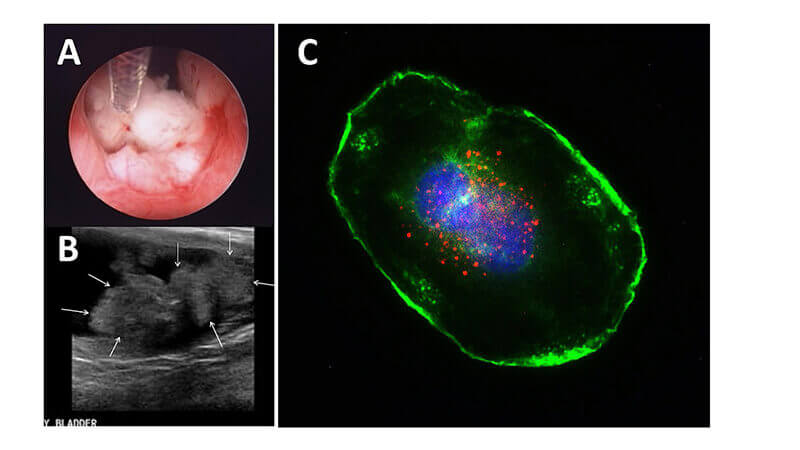November 12, 2019
Anthrax may be the next tool in the fight against bladder cancer
 Pet dogs suffering bladder cancer, for which all other approaches failed, were treated with a Purdue University experimental approach. A: Bladder cystoscopic biopsy being performed in patient dog to investigate tumor characteristics. B: Ultrasound image obtained to record tumor mass dimensions. Sagittal view of the bladder. Arrows point to mass in the neck of the bladder. C: Presence of Epidermal Growth Factor (EGF) Receptor on bladder cancer cells was revealed by binding and uptake of fluorescently labeled EGF (red). Nucleus (blue) and actin cytoskeleton (green) are also shown. (Image provided)
Download image
Pet dogs suffering bladder cancer, for which all other approaches failed, were treated with a Purdue University experimental approach. A: Bladder cystoscopic biopsy being performed in patient dog to investigate tumor characteristics. B: Ultrasound image obtained to record tumor mass dimensions. Sagittal view of the bladder. Arrows point to mass in the neck of the bladder. C: Presence of Epidermal Growth Factor (EGF) Receptor on bladder cancer cells was revealed by binding and uptake of fluorescently labeled EGF (red). Nucleus (blue) and actin cytoskeleton (green) are also shown. (Image provided)
Download image
WEST LAFAYETTE, Ind. – Anthrax may soon help more people win the fight against bladder cancer, which the U.S. Centers for Disease Control and Prevention says strikes about 72,000 Americans each year and kills about 16,000, and is one of the most expensive cancers to treat.
The current treatments for bladder cancer are invasive for patients – who often must sit for hours at a time with a bladder full of an agent designed to kill cancer cells and tumors. Bladder cancer also is one of the most recurring for people diagnosed with the disease.
Now, researchers at Purdue University have come up with a way to combine the anthrax toxin with a growth factor to kill bladder cancer cells and tumors. The research is published in the Oct. 4 edition of the International Journal of Cancer.
“We have effectively come up with a promising method to kill the cancer cells without harming the normal cells in the bladder,” said R. Claudio Aguilar, an associate professor and the assistant head of biological sciences in Purdue’s College of Science. “It is basically like creating a special solution that targets cancer cells while leaving healthy cells alone.”
Aguilar said the bladder has its own protective layer, which saves the good cells from the anthrax mixture but offers no protection for the cancer cells and tumors. He said the Purdue system works within minutes – instead of the usual hours for bladder cancer treatment – to target the cancer cells in the bladder.
“We have seen outstanding results with our treatment,” said Aguilar, who works as part of a team focused on cell identity and signaling at the Purdue University Center for Cancer Research. “It is fast and effective, both of which are critical for people dealing with this devastating disease.”
Aguilar and his group worked with the Purdue teams led by Timothy Ratliff, a distinguished professor of comparative pathobiology and the Robert Wallace Miller Director of Purdue University Center for Cancer Research; and Deborah Knapp, the Dolores L. McCall Professor of Comparative Oncology and director of the Purdue Comparative Oncology Program, to test their solution in dogs with bladder cancer who had run out of other treatment options. They found this new agent decreased the tumor size without causing any other side effects in the animals.
The Purdue team thinks a similar treatment may help people and animals with other cancers, including those affecting the lungs or skin.
The researchers also worked with partners in the Indiana University School of Medicine, the Massachusetts Institute of Technology and Harvard University.
Aguilar and the other researchers worked with the Purdue Research Foundation Office of Technology Commercialization to patent the new treatments. For more information on licensing a Purdue innovation, contact the Office of Technology Commercialization at otcip@prf.org and mention track code 2014-AGUI-66886.
About Purdue Research Foundation Office of Technology Commercialization
The Purdue Research Foundation Office of Technology Commercialization operates one of the most comprehensive technology transfer programs among leading research universities in the U.S. Services provided by this office support the economic development initiatives of Purdue University and benefit the university's academic activities. The office is managed by the Purdue Research Foundation, which received the 2016 Innovation and Economic Prosperity Universities Award for Innovation from the Association of Public and Land-grant Universities. To learn about licensing a Purdue innovation, contact the Office of Technology Commercialization at otcip@prf.org. The Purdue Research Foundation is a private, nonprofit foundation created to advance the mission of Purdue University.
Writer: Chris Adam, 765-588-3341, cladam@prf.org
Source: R. Claudio Aguilar, claudio@purdue.edu

